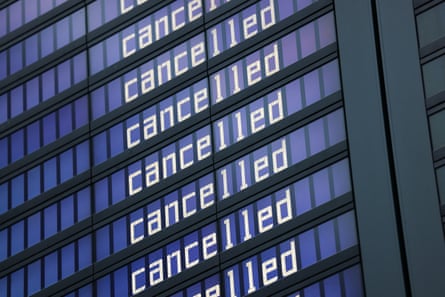German commuters are bracing for major disruption as transport staff across the country get set to stage a major strike to push for wage hikes in the face of brisk inflation.
Workers at airports, ports, railways, buses and metro lines throughout much of Europe’s biggest economy are expected to heed a call from the Verdi and EVG unions and take part in the 24-hour walkout on Monday.
“A labour struggle that has no impact is toothless,” Verdi chief Frank Werneke told public broadcaster Phoenix.
He acknowledged that it would inflict pain on many commuters and holidaymakers, “but better one day of strain with the prospect of reaching a wage agreement than weeks of industrial action”.
To prevent supply gaps, transport minister Volker Wissing has ordered states to lift restrictions on truck deliveries on Sunday, while asking airports to allow late-night takeoffs and landings “so stranded passengers can reach their destinations”.
Verdi represents about 2.5 million public sector employees, while EVG represents 230,000 workers on the railways and at bus companies.
The rare joint call for a strike in Germany marks an escalation of an increasingly ill-tempered pay dispute that comes at a time of surging inflation. Verdi is demanding a 10.5% rise in monthly salaries, while EVG is seeking a 12% rise for those it represents.
Employers – mostly the state and public sector companies – have so far refused the demands, instead offering a rise of five percent with two one-off payments of 1,000 ($1,100) and 1,500 euros, this year and next.
In anticipation of Monday’s walkout, state-owned rail company Deutsche Bahn (DB) has completely suspended all long-distance trains for the and many regional and local connections will be at a standstill.

A DB representative described the nationwide strike as “groundless and unnecessary” and urged the unions to return to the negotiating table “immediately”.
The company expects the walkout to have a “massive impact” on its entire rail network and has pledged to inform its customers “as quickly and comprehensively as possible” about cancellations and delays.
The German airport association said the walkout “went beyond any imaginable and justifiable measure”, while estimating about 380,000 air travellers would be affected.
Like many other countries, Germany is struggling with high inflation after Russia’s invasion of Ukraine sent food and energy costs soaring.
With inflation hitting 8.7% in February, employers have accused labour representatives of contributing to the problem through their demands for increased wages that they say will only feed inflation. Unions dispute this and say their members have been asked to bear the burden of the soaring cost of living.
The “mega-strike”, as local media have dubbed it, follows industrial action in recent months in several German sectors, including the postal service, airports and local transport.
A third round of salary negotiations for public-sector workers is due to begin on Monday.
Some unions however have succeeded in winning big pay increases.
Postal workers won average monthly increases of 11.5% earlier in March, and in November IG Metall, Germany’s biggest union, secured rises totalling 8.5% for almost four million employees that it represents.

 1 year ago
49
1 year ago
49










 English (US)
English (US)